Germany’s election campaign is turning into a fervent ideological clash over starkly differing economic visions.
As Germans become increasingly worried about their country’s ailing economy — set to contract for the second year in a row — the question of how to rekindle growth is shaping up to be the most urgent and contentious issue ahead of the vote, set for Feb. 23.
“The country is losing competitiveness,” conservative leader Friedrich Merz said on Tuesday during the presentation of his alliance’s election program. “We need a stable government that is capable of taking action.”
As large-scale layoffs in German industry begin to bite, and iconic companies such as Volkswagen threaten plant closures, it’s domestic issues — not the war in Ukraine or Germany’s role in Europe — that are dominating the campaign.
The issue most concerning Germans ahead of the election is the economy, according to one recent poll for public television, followed by migration. Russia’s war on Ukraine was fourth on the list.
All the parties are vowing to restore the glory days of German industrial growth, but they have starkly competing visions for how to do so.
Wildly differing plans
Merz — who leads the center-right Christian Democratic Union (CDU) and is in pole position to become the country’s next chancellor — proposes to significantly lower income taxes, as well as cutting the corporate tax rate to a maximum of 25 percent. He also wants to cut social benefits that he argues discourage people from working, and to cut regulations.
These changes, he says, would foster the private investment that would help stimulate the economy.
The fiscally conservative Free Democratic Party (FDP), has a similar policy prescription, proposing cutting taxes for most earners as well as for companies. It also wants to put an end to subsidies for renewable energies, while reviving the country’s nuclear power plants.
The current German chancellor, Olaf Scholz, and his center-left Social Democratic Party (SPD), on the other hand, are pushing for big public investments to spark industrial growth. On Tuesday, Scholz proposed a €100 billion investment fund resembling the Inflation Reduction Act in the U.S. and pledged to increase the minimum wage to €15 per hour from €12.
The goal is for Germany to remain “a successful, strong industrialized country, even in 10, 20 or 30 years from now,” Scholz said.
At the same time, the SPD is calling for tax cuts for most earners and hikes on the rich, while also proposing a “Made in Germany” premium that subsidizes companies’ investments in equipment via a direct tax refund of 10 percent of the purchase price.

The Greens are proposing a “Germany fund” to finance investments in the country’s infrastructure and to bring down the electricity tax to the European minimum.
The fund, according to the party’s program, will “guarantee the younger generation a modern, functioning and climate-neutral country and a competitive economy instead of leaving them with deferred burdens and dilapidated infrastructure.”
Will any of it work?
Economists have raised questions about whether the plans are ambitious enough to confront the structural problems ailing Germany’s economy — high energy costs that are hitting energy-intensive industry and the breakdown of free trade that is core to the country’s export-oriented economy.
There’s also the question of how to pay for it.
Both the SPD and the Greens ulimately wish to unleash public investment by reforming the country’s debt brake, which limits the structural budget deficit to 0.35 percent of GDP, except in times of emergency.
The CDU, on the other hand, wants to adhere to those spending rules, arguing in its party manifesto, that “the debts of today are the tax increases of tomorrow.”
German economists have criticised the parties’ plans as promising more than they can deliver, though Merz’s tax cuts have come under particular criticism.
Economists and Merz’s opponents estimate the conservatives’ proposed tax cuts will add up to as much as €100 billion annually, and many say that economic growth won’t be anywhere near robust enough to offset the lost revenue, as Merz argues it will.
When asked about the criticism, Merz, however, argued “the decisive factor is to restore Germany’s willingness to perform and its ability to grow.”
Then, he explained, the financing issues would appear “in a completely different light.”


